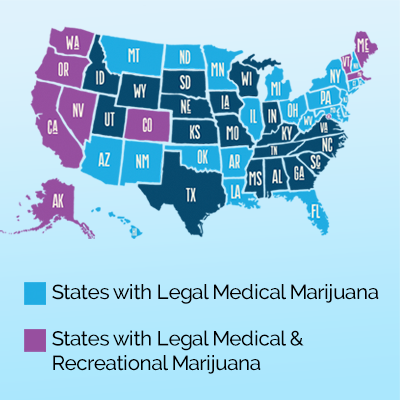Nine states and the District of Columbia currently permit the recreational use of marijuana, and 30 states allow its use for medical purposes. Depending on where you are in the country, your employees may very well be within their legal rights to consume marijuana. But how does the law jibe with your organization’s specific policies around it? Just like the patchwork of state-by-state laws surrounding its consumption, there is no single clear-cut path forward for employers looking for a way to navigate the confusion.
Vast state-by-state variations
All states that permit some form of recreational marijuana use have exemptions when it comes to workplace drug policies. In Massachusetts, the law says that employers have the authority to “enact and enforce workplace policies restricting the consumption of marijuana by employees.” But when it comes to medical marijuana use, things get a little trickier. A California court recently maintained that an employer has the right to discipline employees for marijuana use — even if it is medically approved. But in Arizona, an employer can’t discriminate in any way against a medical marijuana user who fails a drug test. Bottom line — know your state’s laws and act accordingly.
Testing for marijuana
Some organizations would like to enforce a zero-tolerance policy for marijuana use while at the workplace, and believe that random drug testing is the best way to accomplish that goal. There’s just one problem with that approach. Unlike a breathalyzer which can immediately determine an individual’s blood alcohol content, random drug screenings can’t accurately determine marijuana impairment in the moment. Also, testing that is too frequent can create privacy rights issues for employers.
Your workplace policy
In order to ensure that your organization is protecting itself and its employees, as well as complying with all regulations, consider the five following points when dealing with marijuana:
- Review of policies should include a current review of state regulations where you operate.
- Review all of your organization’s job descriptions for safety-sensitive positions, and make your stance on marijuana clear-cut from the start.
- Communicate with employees and applicants clearly about your drug screening practices and consequences for use.
- Be sure to get expert advice and consult legal counsel before finalizing policies.
- Be sure to train managers on how to deal with use on the job, and how to identify signs of using at work.
Contact JDP for help designing your drug screening program!
